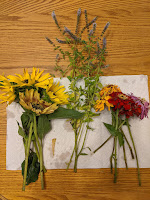Posted by: Deryn Davidson, Horticulture Agent, Boulder County
One of my favorite things to do this time of year is make bouquets and flower arrangements from freshly cut flowers out of the garden. Lots of people plant flowers in their vegetable gardens and those common species are great for arrangements. Sunflowers, zinnias, dahlias, marigolds, snapdragons, and even herbs like dill and mint make great material for bringing a splash of garden beauty into your home. Of course you can combine any of those, with flowers from your annual and perennial beds too.
 |
| Sunflower, zinnias, mint and dill |
There's a good chance that if you cut a handful of flowers from your garden and pop them in a vase, they'll look pretty good, but pro floral design definitely requires technique, practice and creativity. Here are a few tips you can follow to take your garden bouquets to the next level.
THE FLOWERS
1. Cut your flowers early in the morning before the heat of the day sets in.
2. Make clean cuts at an angle with a sharp tool. This allows for better water uptake.
3. Choosing flowers and plant material to combine: larger flowers for mass; tall thin material to create lines and define the shape of the arrangement; fillers to fill in empty spaces.
***Sometimes you'll have an arrangement that is all mass or all fillers, but when starting out look for a variety of shapes and texture to give your design more interest***
THE CONTAINER
This can be anything that holds water. Vases, coffee cans, pitchers, mason jars, you name it! You want to generally match the container to the flowers. Big heavy flowers (ex: peonies) need a container that will visually balance them out and also avoid making the arrangement top heavy and possibly falling over.
THE ARRANGING
I like to spread my plant material out on the table and assess what I have. Then you can start adding pieces to the container one by one and build the arrangement.
Key things to keep in mind as you design
1. Proportion: This is not only about the flowers, but also the container. As I mentioned, find the right container for the flowers you've chosen, but also pay attention to how each flower relates to the others in size. You can start to image your arrangement before you begin to build based on what you see in front of you. You want your container to be about 1/3 the height of the overall arrangement.
2. Balance: You can go with symmetrical, where each side is pretty much a mirror image of the other side. Or asymmetrical where if a line is drawn through the middle of the arrangement the two sides are not mirror images, but they are equally "weighted". Perhaps you have 5 small flowers on one side and 1 large flower on the other to balance things out.
3. Harmony: Look at the colors you've chosen. Are they complimentary (opposite sides of the color wheel like yellow and purple) or perhaps monochromatic (one color).
 |
| Sunflowers, zinnias and mint |
 |
| Bachelor buttons, Engelmann's daisy, dill, larkspur (arranged by Allison Appelhans) |
 |
| Zinnia, prairie sage, blanket flower, marigold (arranged by Allison Appelhans) |
 |
| Goldenrod, cosmos, maxmillian sunflowers, salvia, aster, verbena (arranged by Allison Appelhans) |


Great post! Thanks for the lessons and photographs
ReplyDeleteThank you for writing this--lovely!
ReplyDelete